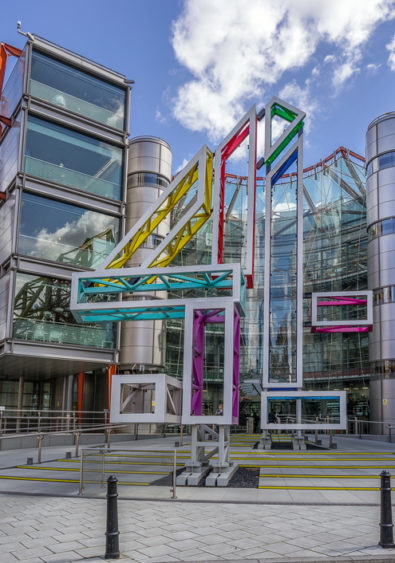Determination, equality, inspiration and courage. These are the Paralympic values that played out every single day, in every single sport this summer during the Tokyo 2020 Paralympic Games.
As our Paralympic athletes have now come home with 124 medals, we have a real opportunity to do two things. First, to recognise and honour their determination and courage, often in the face of almost overwhelming adversity, to be the very best. Second, to continue to transform society’s attitudes to disability.
All the teams and athletes all share one thing in common. They have all had an almost unrivalled opportunity to be able to share their triumphs, and their disappointments with the British public because Channel 4 was with them every step, every stroke and every leap of the way.
Because of Channel 4, no Paralympic moment was undocumented; no Paralympic hero unsung.


Their association with the Paralympics Games began in 2012, continued in Rio and resulted in Tokyo with the broadcaster’s most ambitious coverage ever.
With each of the Games they have, like the athletes they have covered, challenged themselves – to be even better, even bigger and even more accessible. From their studios in Tokyo, Leeds and London, they provided over 1300 hours of coverage and 16 live streams – more coverage than was on terrestrial TV for the Olympics only weeks before.
For the first time almost three quarters of their presenters and commentators were disabled people, and they increased the number of senior personnel with disabilities behind the camera.
Yet Channel 4 went further. As well as the Games themselves, Channel 4 wrapped a rich mix of programmes around the competition, keeping disability front of mind and very much in sight. There was The Last Leg, Jonnie’s Blade Camp, and Billy Monger’s Changing Gear.
Channel 4 brought us sport and entertainment, where disability not only did not matter, but was celebrated. What other broadcaster has matched their commitment to representation and opportunities for disabled people?
As a result, the Games in Tokyo were watched by an incredible 19.3 million people – thirty-two per cent of the TV population. In terms of Channel 4’s digital service, there have been almost two and a half million views on All 4, sixty-one per cent of which was live viewing.
But commitment like this comes at a price. It might surprise the British public to know that Channel 4 does not profit from the Paralympic Games or the programmes it makes to support them. Yet that has not deterred them.
Margaret Thatcher created Channel 4 to challenge established thinking and give a voice to the marginalised and the under-represented. With each successive Paralympic Games since London, Channel 4’s coverage has not only increased awareness and understanding of people with disabilities, but also given people – especially young people – the confidence to talk about disability and challenge preconceptions.
So, you have to ask yourself – in a future where Channel 4 could become more focused on profit than programmes, on share price than society, what is the future for the Paralympics Games and the wider celebration of the achievements, talent and creative excellence of people with disabilities?
I support the Government’s disability strategy to improve accessibility and inclusivity. However, all of us have a role in transforming society’s attitudes towards disability.
Channel 4 has shown the way this year. It has engaged and entertained millions of viewers with its pioneering coverage of the awe-inspiring feats of the world’s Paralympians in Tokyo.
It helped unite the nation behind Emma Raducanu as she made tennis history at the US Open this month. Their partnership with Amazon Prime Video enabled over twelve and a half million viewers to enjoy and be part of a national moment, without having to pay a single penny.
Would another commercial broadcaster have agreed to take a live broadcast of the US Open without showing adverts – a condition of making it free to air for everyone?
Channel 4 has also broadcast quality live coverage of Lewis Hamilton’s latest tilt at the Formula One world championship, and has brought live Test Cricket and the British and Irish Lions back to terrestrial TV again for the first time in many years.
Sport can truly prevail and make a difference.
That is why Channel 4 secured the Paralympics and the US Open, knowing they would lose money. The Paralympic Games are and always should be – like every sporting moment that they broadcast – the ultimate example of public service broadcasting.
For the Paralympics, for the US Open final and the 2019 Cricket World Cup final, they decided to put the public before profit.
Channel 4 is a unique and valuable lever – accountable to Parliament and owned by the people. It has helped shape attitudes, beliefs and understanding of disability and many other social issues.
The success speaks to Channel 4’s public service remit on many levels. Channel 4 is more than a broadcaster. Its value lies in its publicly owned model, which enables it to take more risks than commercially owned rivals who make safer bets with a more ruthless focus on their bottom line. It’s worth remembering that no other commercial broadcaster even bid for the 2012 Paralympics.
These risks on the Paralympics have paid off to deliver a substantial public impact for disabled people here in the UK, and overseas. As the Government considers Channel 4’s future, we should reflect on whether we risk jeopardising this game-changing success.
Helen Grant MP is a former Minister for Sport (2013-15). She also chairs Channel 4’s APPG in Parliament.












